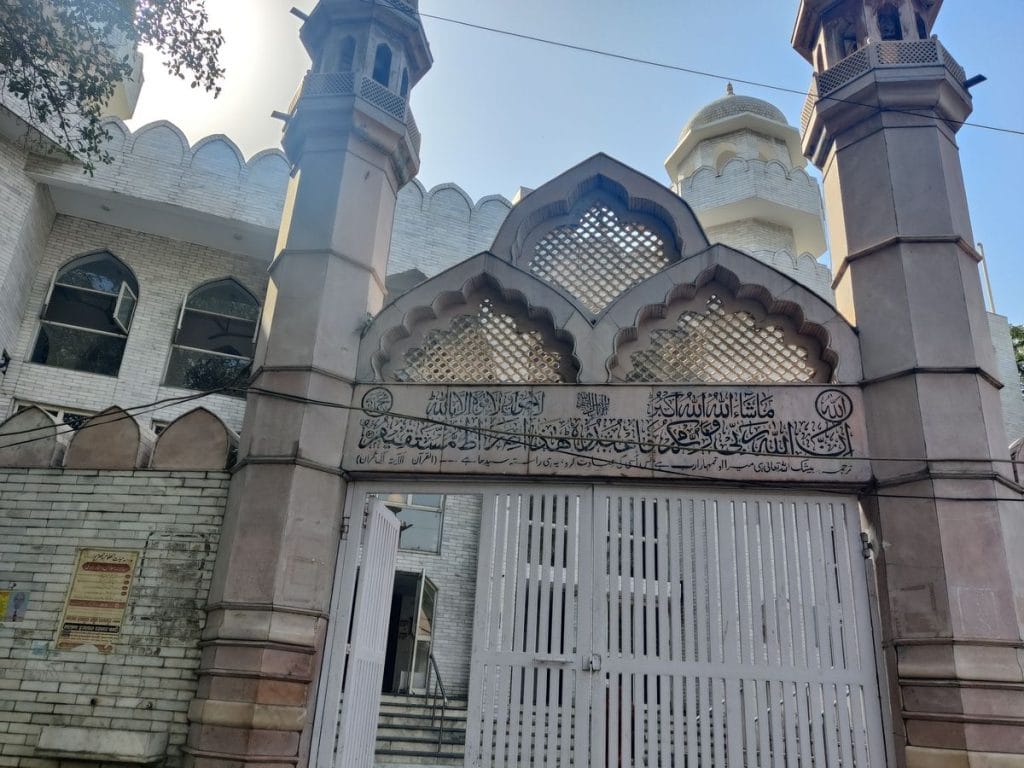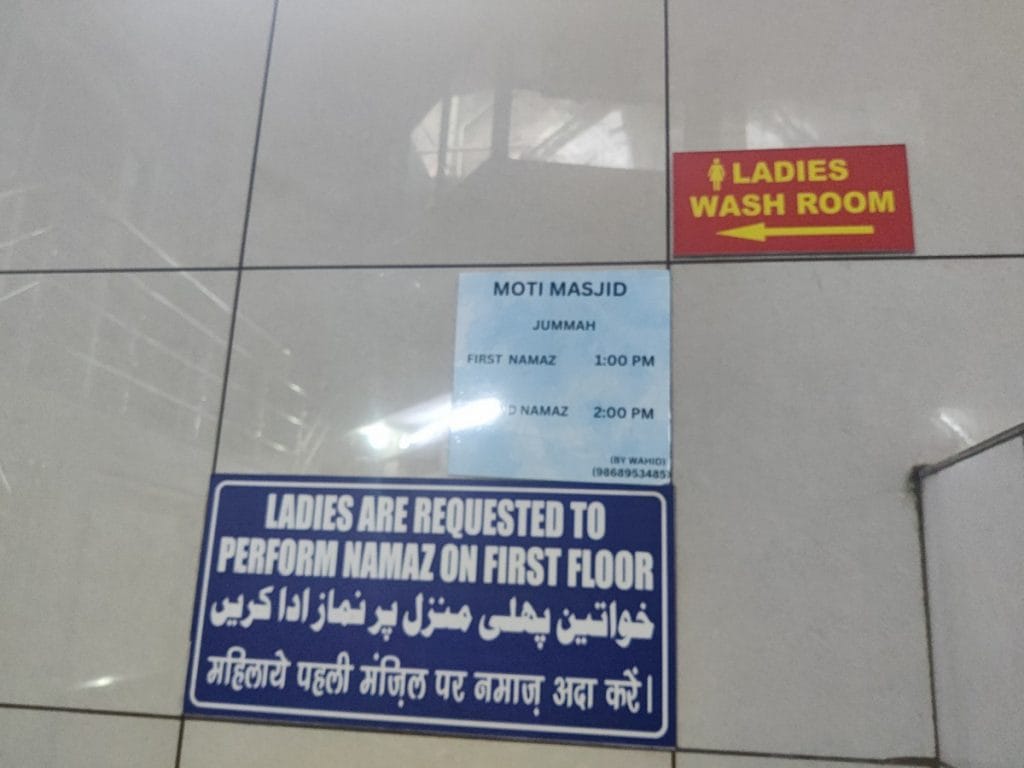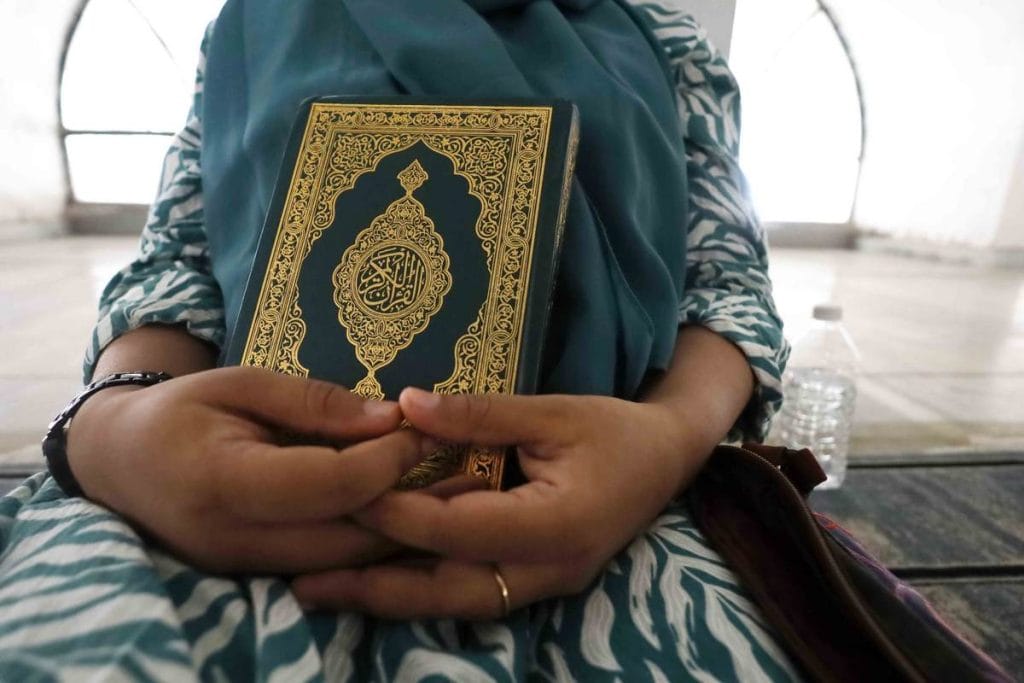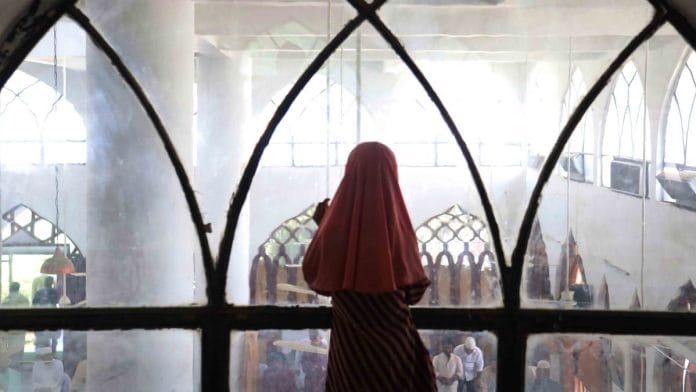New Delhi: Most days, 55-year-old Akila limps through the corridors of AIIMS or Safdarjung, chasing treatment for chronic knee and back pain. But the ache that burdened her the most wasn’t physical. She had nowhere to offer her daily namaz. For that deep sense of guilt, she’s finally found a remedy.
Just a 10-minute walk from AIIMS, she discovered the Green Park masjid. And it offered something precious: a dedicated section for women, complete with a washroom and a separate wuzu (ablution) area.
For women, just entering a place of worship has often been a fight. Regardless of the religion, be it Sanatan Dharma or Islam, sacred spaces have drawn lines. Some are old taboos, others are new rules made up by men. In Kerala, Hindu women waged a legal battle over entry into the Sabarimala temple, which culminated in a landmark Supreme Court judgment in 2018 allowing them to enter. In Delhi, the Jama Masjid administration imposed a ban on unaccompanied women and girls to prevent “obscene activities”.
Now, Muslim women are pushing back too. The sight of women going to mosques in large numbers, especially to offer namaz, is still relatively new in India. But more mosques are making space.
Among the over 500 mosques in Delhi, a handful now have women-only facilities. They’re places where women can walk in without the sense of intruding, whether for Friday prayers or to practice their faith whenever they feel like it.

Green Park Masjid, Moti Masjid, Auliya Masjid in Connaught Place, and Ishaat-e-Islam Masjid run by Jamaat-e-Islami Hind are among them. Some offer a full floor, others just a room, but what they have in common is the message that women are welcome.
“Praying at home and in a mosque feel completely different. And it’s our right,” said 21-year-old Farah Shakil, who takes time out from her studies every Friday to attend Jumma at Jamaat-e-Islami Hind Masjid. “When there’s proper space available, women should come and pray. So that the practice of women offering namaz in mosques becomes more normalised.”

Since discovering Green Park Masjid, Akila has been spreading the word to other women. The mosque’s Imam, Mufti Nizamuddin, said women passing through the area often stop by.
“Even women doctors from nearby hospitals visit the mosque during prayer times,” he added.
Also Read: No burqa, no men to be wary of—Daryaganj’s Parda Bagh brings women out to laugh, talk, play
More than a spiritual space
Children dart about, laughing and playing, as about a dozen women settle on deep-red carpets laid over off-white marble. Some count prayer beads. Others scroll through Quran verses on their phone screens, reciting the words as they go along. A few have small children in their laps, guiding small hands through the motions of ibadat.
This is the daily rhythm at Markaz, Jamaat-e-Islami Hind Masjid. On Fridays, the congregation swells. More than a hundred women gather here for Jumma, coming from near and far. They pray, have religious discussions, and socialise with each other.

“The fact that there’s space for women in the mosque, and that so many continue to come regularly, shows just how much they’ve been yearning for such spaces,” said 51-year-old Ameena Bano, who lives about five minutes away. “Allah has permitted women to go everywhere, so why not the mosque?”
This demand from women for space inside mosques is relatively recent. Dr Asma Zehra, president of the All India Muslim Women’s Association (AIMWA), said it gained momentum when more Indian women started travelling for Umrah and Hajj. In Mecca and Medina, they noticed that every mosque had a designated space for women—a sight that was rare in India. Following that, the demand for such spaces started to emerge in India.
“Traditionally, women in India do not go to mosques to offer prayers. However, with globalisation, the culture of women praying in mosques has been adopted from countries in the Middle East and Southeast Asia,” said Zehra.

In 2019, a group of women formed the Muslim Women Masjid Project (MWMP), an initiative launched bt the Muslim Women Study Circle (MWSC), a homegrown collective. Founded by Sania Mariam, the organisation’s main focus is to raise awareness and encourage more mosques to become inclusive for women.
Zehra pointed out that there’s no widespread opposition to the idea in the community. A few mosques already offer such spaces, and newly built ones are starting to include them by default.
At 1 pm on a Friday, the men in the ground-floor hall of Markaz stand in straight lines as the Imam approaches the mic and greets everyone with salaam.

On the first floor, just above the main prayer area, the women straighten up as well. The Imam begins his bayan (sermon). Today’s topic is a controversial one: the Waqf Bill. For the next hour, he breaks it down—what Waqf property is, why it matters, and why the recently passed Waqf Amendment Bill is worrisome for Muslims. He calls it a misstep by the government that could deeply affect the rights and assets of Muslims across the country.
“Our purpose in coming to the mosque isn’t just to visit a place or do namaz,” said Bano. “The mosque is not only for prayer. Every week, important discussions take place on social, cultural, and religious issues. These conversations give us a deeper understanding of what’s happening around us—something we might not get at home, or simply may not find the time for on our own.”
Searching for peace
The Markaz mosque sits inside a calm, green campus with trees, flower beds, and clean, well-kept buildings. Men and women come and go at all hours, some for prayer, others for community work or classes.
Run by Jamaat-e-Islami Hind, an organisation that operates mosques and institutions across the country, it’s part of a larger network focused on the upliftment and welfare of the Muslim community.
Rahmatunnisa A, national secretary of Jamaat-e-Islami Hind’s Women’s Department, is often here. She helps run the women’s initiatives here, including sessions on safety, health, and even training programmes for women preparing for Hajj.

“Visiting the mosque is a way to engage with one’s community and connect with people. It’s a need and a right that belongs equally to both women and men,” said Rahmatunnisa.
About 14 kilometres from the tranquil Markaz, a very different scene unfolds at Moti Masjid in Connaught Place.
Amid the chaos of bookshops, clothing stores, and shoe vendors at CP, a small board reads Moti Masjid; just beneath it, another green signboard has a message written in even more diminutive Urdu and Hindi letters: “Women may offer prayers on the first floor.”
Inside, Inside, a shoe rack stands to one side. Just ahead lies a spacious hall, usually occupied by men in prayer.

Upstairs, there’s a carpeted hall with a row of wuzu taps. It’s quieter, with just a couple of women sitting in contemplation. In one corner of this women’s space sits 26-year-old Anam Jahan, who comes here for spiritual succour whenever she needs a break from the frantic pace of her restaurant job.
“This place gives me peace. I come here for prayers, of course, but even when I have no particular reason, if I have time, I just come and sit quietly in a corner,” she said.
Also Read: Delhi’s Urdu Bazaar is dying. Mughlai sells, not Manto & Mirza Ghalib
Legal challenge
There’s no signboard designating a special prayer space for women at Auliya Masjid in CP, about a five-minute walk from Moti Masjid. The first floor, however, is often kept vacant to accommodate them.
Imam Ahmed said that because the mosque is in a busy commercial area, women don’t visit regularly. But during Ramadan, and especially on Fridays, many do stop by when they hear the azaan, offer their prayers, and move on.

“There are no restrictions on women entering mosques,” said 46-year-old Ahmed. “Whether or not a designated space is available for them often depends more on the physical structure and space of the mosque than on religious beliefs or ideology.”
Most mosques, especially older ones in crowded areas, were built without much room, he added, making it difficult to create separate arrangements for women.
In 2023, Pune-based activist and advocate Farha Anwar Hussain Shaikh filed a petition in the Supreme Court, arguing that the practice in some mosques of barring Muslim women was illegal.
In its response, the All-India Muslim Personal Law Board (AIMPLB) denied any blanket prohibition. It said Islam allows women to pray in mosques but prohibits free intermixing of men and women in common spaces.

“Though permission was given to women to pray in the mosque, the congregation is not obligatory for them as it is for men. That’s why women did not generally attend the mosque congregation during the time of the Prophet,” the AIMPLB said in its affidavit submitted to the Supreme Court.
The AIMPLB later said it was seeking clarity from the court on women’s entry into mosques to offer namaz, and urged Muslims—especially when new mosques are being built —to ensure appropriate space is made for them.
Imam Nizamuddin of the Green Park Masjid said this hasn’t happened across the board, since “women do not regularly come to the mosque in large numbers”.
But in Moti Masjid, Anam Jahan said designated areas for women are important even if they aren’t always full.
“Having a space like this, aside from our homes, gives us an environment where we can focus on our worship,” she added. “It gives me a kind of peace I don’t even find at home.”
(Edited by Asavari Singh)







Ms. Almina Khatoon simply could not resist the temptation of dragging in Sanatan Dharma and accusing it of inequitable treatment towards women.
In an article focused on Muslim women’s religious rights and their wider acceptance within the community, she just had to bring in Sanatan Dharma and vilify it for “degrading” women.
For an impartial observer, the staggering difference between modern Hindu women and Muslim women is quite clearly visible. Hindu women regularly beat their male counterparts in academics and compete with them on equal terms in both the government and corporate sectors.
As far as temples are concerned, only a handful of temples such as the one mentioned in this article prohibit the entry of women. Almost all Hindu temples allow women to enter and worship. Can the same be said of mosques?